Steven Spurrier Collection – JOP article
Remembering Steven Spurrier and the 1976 Judgment of Paris Tasting
Last November, the library received a parcel holding precious cargo: newspaper clippings and correspondence about the 1976 Judgment of Paris Tasting — a blind tasting that rated California wines above French wines. The sender was Steven Spurrier, the English wine merchant, consultant, and writer who organized the original tasting-turned-competition at his Parisian wineshop with his American colleague Patricia Gallagher.
Spurrier died earlier this month, on March 9. While there are many obituaries now that honor his life and his life’s work with wine, my favorite is by wine writer Jancis Robinson, one of the judges on the panel for a 30th-anniversary tasting (with fellow writer Hugh Johnson) held in London in 2006.
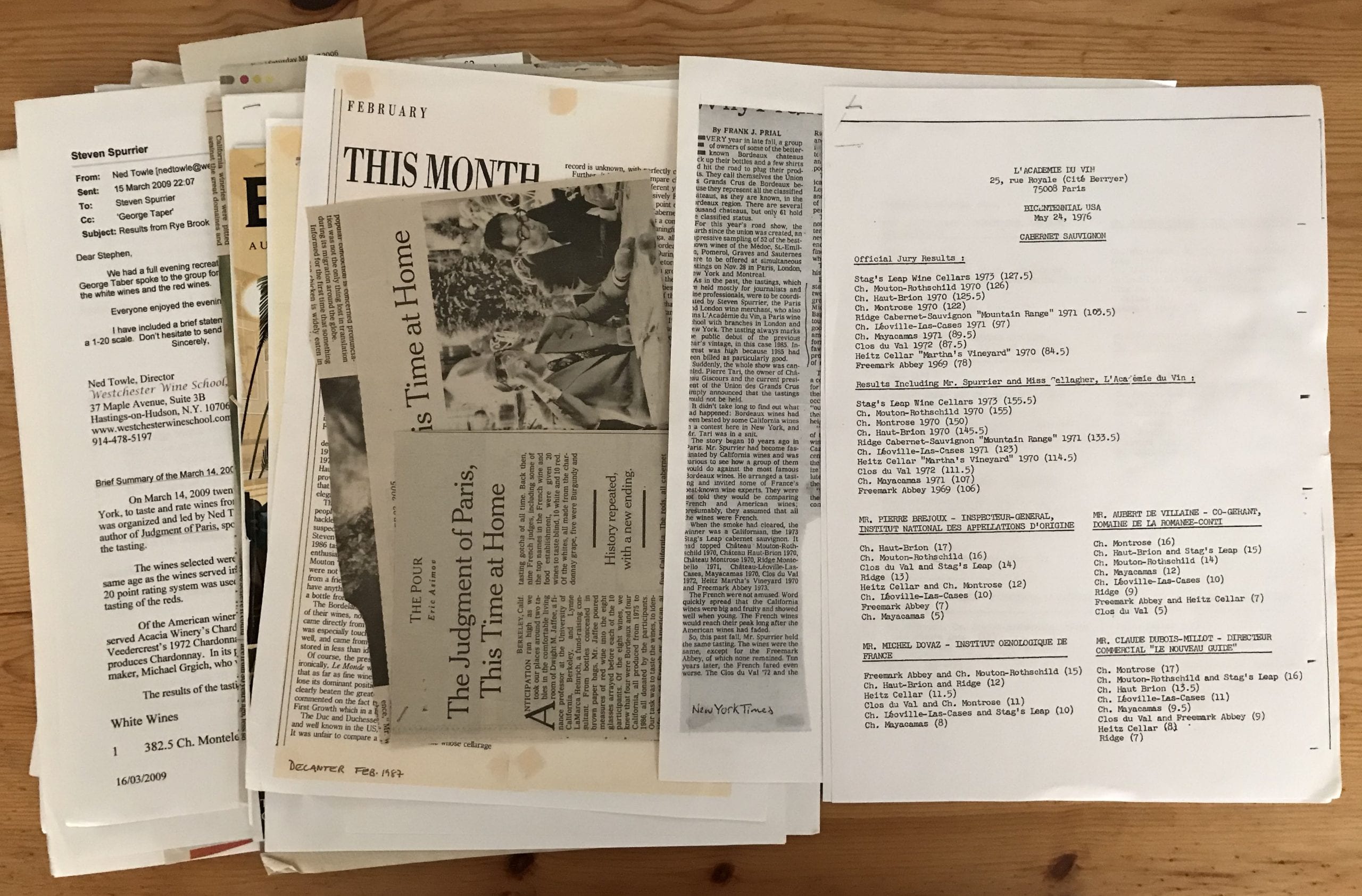
“I Throw Everything Away”
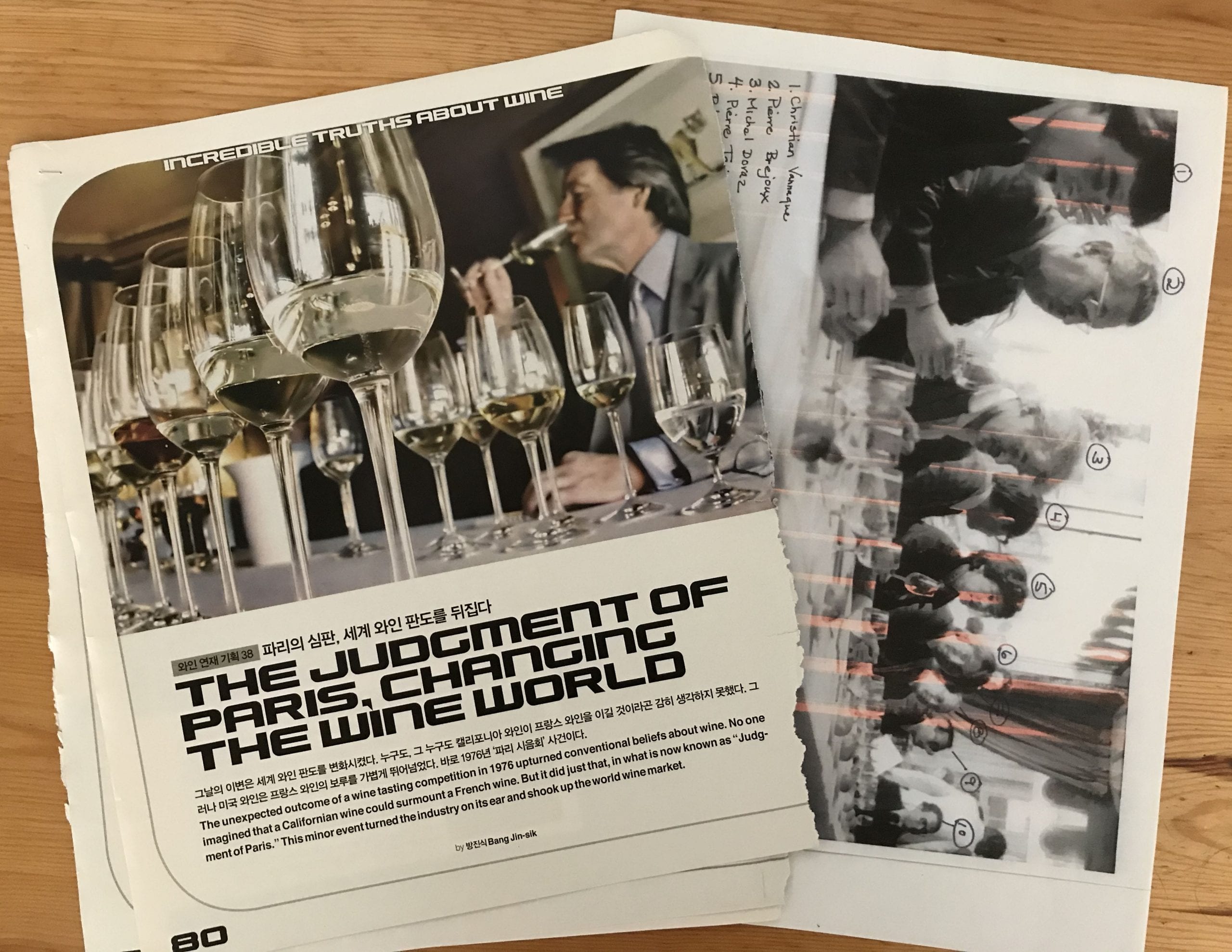
I had the honor of meeting Spurrier exactly one year before his donation and just a few months before the pandemic led to the shut-down of transatlantic travel. I wanted to talk with him about his papers and the new publishing venture he was promoting, the Académie du Vin Library, named after the wine school that he established at his shop in 1973. He was in San Francisco for the city’s International Wine Competition and was kind enough to make time to meet with me at the bar in Hotel Nikko.
I was immediately struck by Spurrier’s attentiveness, wit, intensity and generosity, which several writers have remarked on in their remembrances of him. He said that he was touched by the library’s interest in his papers but “I throw everything away once it has been written and gone off to wherever, and do not keep any correspondence, so I have virtually nothing as an archive!”
That turned out to only be partly true: While Spurrier didn’t have objects or writing from the original tasting, he had saved contemporary and retrospective writing about the event, which was mythologized in accounts soon after it occurred and well into the future, most notably in the 2008 movie Bottle Shock.
The Judgment of Paris: Creating and Correcting the Record
Having worked with the library’s wine archives for two years, and having had the privilege of learning about this state’s wine industry from some of the people who built it in the 1970s, I often take it for granted that the Judgment of Paris is a piece of Americana known to all, as much a part of the history books as the victory at Yorktown.
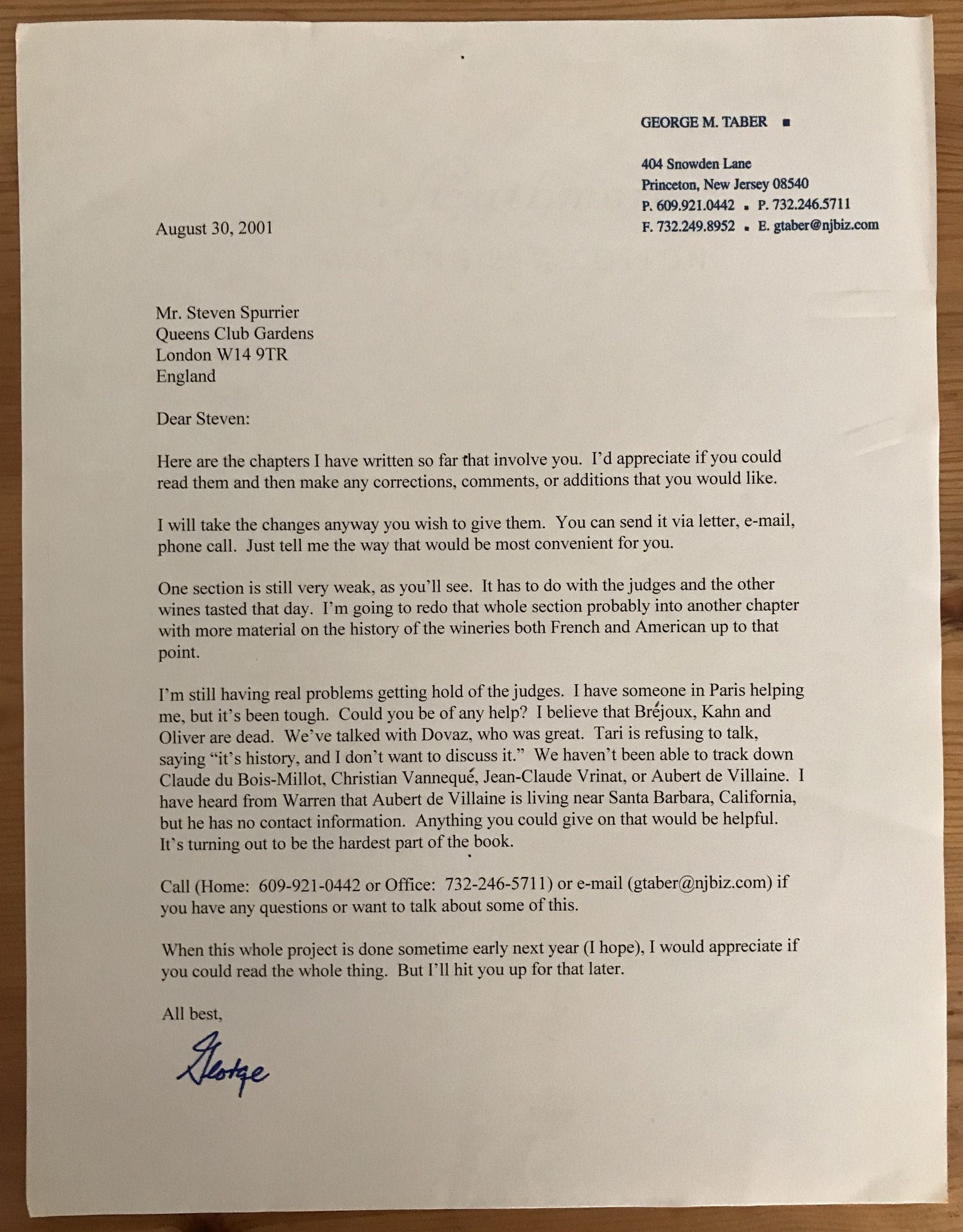
Is there a more American line than “Not bad for kids from the sticks?” That’s what Chateau Montelena’s owner, Jim Barrett, said when asked for a comment by George Taber, sole reporter of the event, who covered it for Time because, according to him, it had been a slow news week. But not long ago I mentioned the tasting to a room full of viticulture and enology students, most of them in their early 20s, and drew blank stares. “Bottle Shock?” I asked, and the students nodded in recognition.
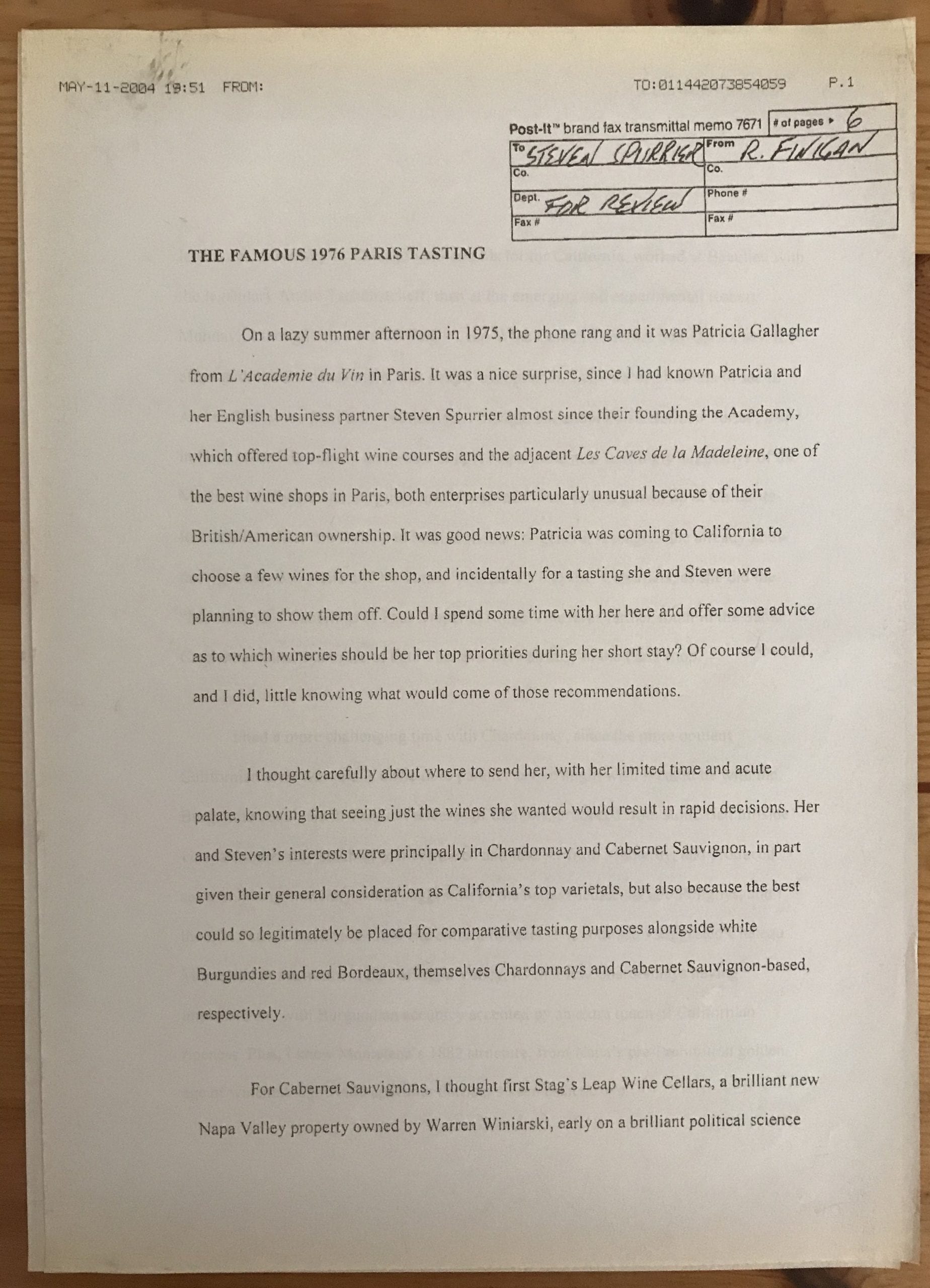
Wine, as a target for teetotalers and bacchanals alike, can get roiled in the machines of morality and marketing. I think that Spurrier understood this and and worked to counter their effects. Although he wrote in a letter to a Beth Rodda, dated March 26, 1996, “[T]he 1976 tasting seems to have had a much bigger effect on most everyone rather than on me, and so, even in 1996, I don’t think of it as much else except a historical one-off,” Spurrier participated in or lent his voice to events commemorating it for decades to come. He often corrected the record, including to me, about facts got wrong.
Without him the event wouldn’t have occurred— or, anyway, he and Gallagher cast the die that set the rest in motion, and then Spurrier continued on as the keeper of the flame (along with, he would argue, winemaker Warren Winiarski). Now, even without the embellishments of that fateful day, so much about the tasting seems providential. As James Laube, longtime writer for Wine Spectator, has noted, “What if the French wines had won? Or Taber, the only journalist to attend, had skipped the event for a walk in the park? No story. No book. …Without the Paris Tasting, California would still be one of the world’s leading wine producing regions. But the Paris upsets accelerated the world’s awareness of this evolution.”
A Life in Wine
In 2001, Spurrier was invited to a 25th-anniversary party by Mike Grgich, the winemaker responsible for the Chateau Montelena 1973 Chardonnay that had topped the other whites in the tasting—French and American alike. By the time I came across Grgich’s invitation, I felt like I had walked through a long hall of mirrors: blind tasting after blind tasting, this one pitting Chilean wines against Bourdeaux, that one a flight of English sparkling wines against champagne. Grgich’s letter gave me something solid to hold on to: It distilled the tasting into meaning and impact in one short paragraph.
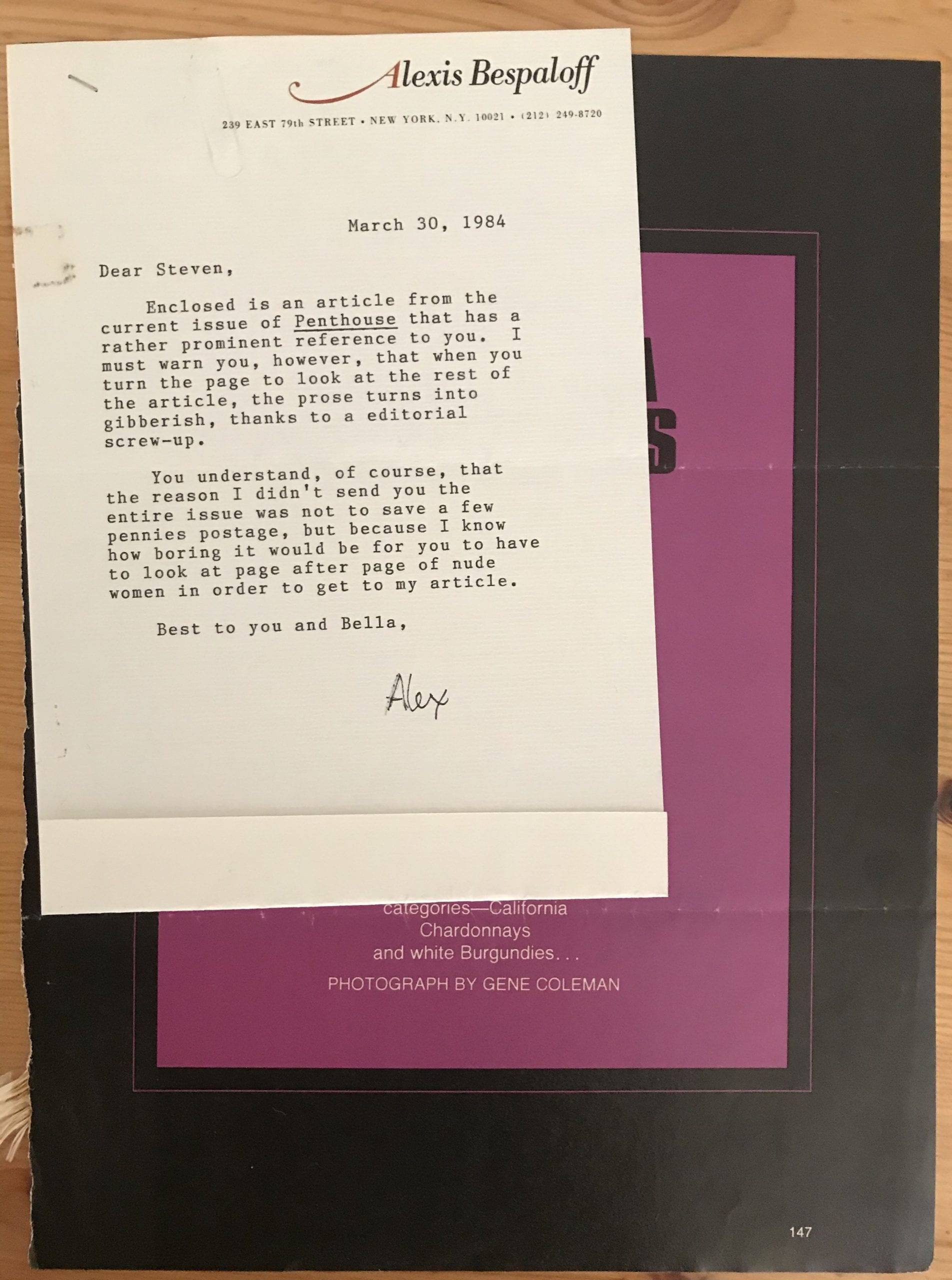
Mr. Spurrier,
I was pleased to speak with you this morning and I am following with this information.
I am writing to you with the utmost respect and gratitude for all you have done for the Napa Valley and for me personally. While the formal invitations are at the printer’s I don’t want to hesitate to invite you to our gala events celebrating the Paris Tasting on May 19, 2001. I would be most honored if you could attend these events though I understand your busy schedule. If you find that you can attend, I will gladly pay your expenses. If you are unable to attend, would it be possible for you to send a letter that could be read to the people attending this Silver Anniversary? Your tasting has made such an impact on the Napa Valley we would be thrilled if you could share some thoughts with us.
Most gratefully,
Mike Grgich
Spurrier’s response to Grgich included his remarks for the gala and ended with these reflections:
There is no doubt at all that we are living through a Golden Age of Wine, and, after 37 years in the business (a few years less than yourself!), I am every bit as excited and impressed by it all as the day I began.
There is a saying that ‘God created wine to show He meant for us to be happy.’ Wine has been my life, as it has been yours, and I could not have wished for a better one.
Located among the tasting notes, journalism, debate and sentiments that traversed the spectrum from triumphant to indignant, his words ring true to me. Spurrier was able to stand in the tide and see the continuum, from where wine had come to where it might go, and he followed its course with elegant optimism and humor.
Related Collections
- Wine and grape manuscript collections, including the Wine Institute Records, U.S. Bureau of Alcohol, Tobacco, and Firearms Records on California Wineries, Robert G. Mondavi Papers, Dorothy and André Tchelistcheff Collection, and Joanne DePuy Papers
- Warren Winiarski Wine Writers Collection, including the papers of writers Jancis Robinson, Hugh Johnson, and Bob Thompson